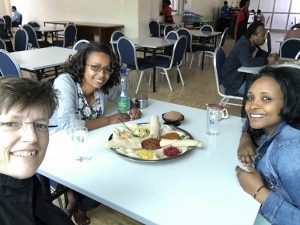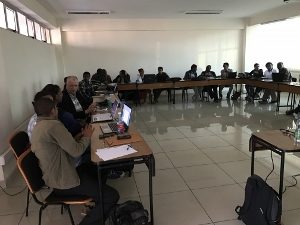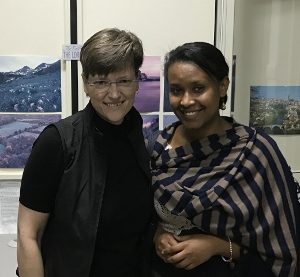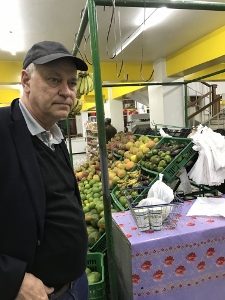The power still wasn’t on in the morning, so tea water was boiled on the gas burner. Yup, I’m glad I took my shower yesterday!
Staffan and I headed over to EGST (Ethiopian Graduate School of Theology) where he had a morning class with a 2-hour time frame. After the first hour he came to the office (where I’m checking email and working on my presentation), and he stated that he had chills and felt like he had a fever. He was going to dismiss his class for the second half, but the students prayed for him before he left. Staffan also arranged a driver to take me home after my class presentation in the evening.
I stayed in the office with Internet access (emails, news, etc.) and continued some tweaks to the presentation and lots of reading.
At lunch time, I asked if I could go to lunch with the 2 women prospective PhD candidates. The cafeteria menu is in Amharic, so there is no way for me to understand what is on it! So, they were gracious and changed their lunch plans to take me to the cafeteria, and they wouldn’t let me pay. “This is our culture,” overrides any offers I can make.

We had a wonderful conversation, and I listened to their stories. They feel wonderfully supported as women in theological studies and have been able to access scholarships for women’s development in their graduate studies at EGST. (Note, this is distinctly different from the bachelor’s and master’s program scholarships for women at the Mekane Yesus Seminary [MYS], because the LCMS partners only provide scholarships for women. However, the principal at MYS is eager to find scholarships for women from other sources.)
In the late afternoon, Staffan shows up a new man! He looks refreshed after a nap, but without any recurring fever (and no fever-reducer meds; the fever did not return later or the next day), this is a witness to the power of prayer!
The evening presentation was in a full classroom, as several other students had joined the class. There were 22 students (instead of 12 or so expected, because “generational curses” is a draw!). Of the 22, 5 were women. One of the women is Sarah, who has exceptional English! She is a bright light and an excellent student, according to Staffan. I’ll come back to a bit of her story below.

My presentation started with a summary of my PhD research on generational curses in the Pentateuch. It was significantly shorter than yesterday morning, but I explained the circumstances. However, I also wanted to stimulate some conversation in pairs and in a large group. I wanted to find out if the Maasai lens of “reconciliation” resonated with their context. (Someday, I would like to repeat this research in another context to see what results are generated in a different people group.) I understood that the lens and my summary was meaningful for their contexts, but this was a basic discussion at this time. (And also, what else are you going to tell the guest?)
The second, and larger part of my session was about “other ways of knowing” for this Gospel and Culture course. In summary, I distinguished between the basics of epistemological and ontological knowing, laying out a theoretical rational as to why we need to engage other epistemologies or “ways of knowing.” It was quite theoretical at the beginning, but then I became practical. How do we go beyond theological education in a cross-cultural context (traditional Western theories, methodologies, and pedagogies) to develop cross-cultural theological education. What would it look like to also integrate (not either-or but both-and) ontological ways of knowing and pedagogies for perhaps 30% of the course points? I gave examples from my experience with integrating student-determined projects (that match the course learning objectives and integrate cognitive, attitudinal, and behavioral objectives) that can incorporate indigenous art, music, drama, storytelling, dance, family, and other relationally-connected learning. They were enthusiastic about these ideas. I told the students that I would work on trying to support these developments at EGST, and that please be patient, because there needs to be time for the development of this pedagogy, as faculty have to be convinced and equipped and help to shape it. There is some good educational research on the improved outcomes, but I need to write some of this up. (Hmm, I wonder if I can connect at the Church House [see yesterday’s post] to try to get some funding for ontological pedagogy development for the faculty at EGST?)
(Charlie and Pam, I thought of my skit in American church history and my Psalms Bible studies I prepared for an exegetical Psalms course, which I have used over and over! Thank you for these models.)
Sara, the bright light, thanked me. She had written a paper comparing the epistemology of Jürgen Moltmann with the ontology of someone who was new to me. She said she didn’t know how to develop this, but this is her main theological interest; she was stuck. But now with considering ontologically-oriented pedagogies (she also has read Paulo Freire’s Pedagogy of the Oppressed), she has had a breakthrough of how to take this and run with it! How cool!

Staffan attended the session (still no recurring fever!), and he was very encouraging about the session. While I knew that I had some good connections, the conversation wasn’t as lively as Tuesday’s morning’s class. One student commented that they, as students, are so engrained in a traditional, passive style of learning that they aren’t even prepared to engage more actively or creatively in the class, though they are eager to develop some of this. I said that I sensed that a seed was planted, and we need to be patient as we water and weed the soil. We can tend the garden and hope for good fruit, but it will take time.
Staffan and I stopped at a grocery store on the way back. In addition to fruit, eggs, bread, and other staples, I picked up some ground cloves. Spices are fresh and inexpensive here. The cloves are now my air freshener in my room. I like it!

At home, our neighbor, Teshoma, stopped over to invite us over for dinner tomorrow. I know Teshoma from Norway! Yes, he was at the School of Mission and Theology when I was visiting during one of my PhD study trips. He and another Ethiopian student invited me to Ethiopian tea and snacks. There is a culture of hospitality here. Perhaps ontological ways of knowing is the cradle of hospitality.
With blessings,
Beth